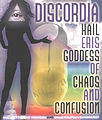- Principia Discordia
-
 The Loompanics "Yellow Cover" combined 4th & 5th Edition Principia Discordia, (1979). In print until the company went out of business in 2006.
The Loompanics "Yellow Cover" combined 4th & 5th Edition Principia Discordia, (1979). In print until the company went out of business in 2006.
Principia Discordia is a Discordian religious text written by Greg Hill (Malaclypse The Younger) and Kerry Thornley (Omar Khayyam Ravenhurst). It was originally published under the title "Principia Discordia or How The West Was Lost" in a limited edition of 5 copies in 1965. The name, meaning "The Principles of Strife", deviates from correct Latin which would read Principia Discordiæ.
The Principia describes the Discordian Society and its Goddess Eris, as well as the basics of the POEE denomination of Discordianism. It features typewritten and handwritten text intermixed with clip art, stamps, and seals appropriated from other sources, possibly in violation of copyright laws.
While the Principia is full of literal contradictions and unusual humor, it contains several passages which propose that there is serious intent behind the work, for example a message scrawled on page 00075: "If you think the PRINCIPIA is just a ha-ha, then go read it again."
The Principia is quoted extensively in and shares many themes with the science fiction book The Illuminatus! Trilogy by Robert Shea and Robert Anton Wilson. While Wilson was not directly involved in writing the Principia, both the letter signed "Mad Malik" and the stamps used were his.[citation needed]
Notable symbols in the book include the Apple of Discord, the pentagon, and the "Sacred Chao", which resembles the Taijitu of Taoism, but the two principles depicted are "Hodge" and "Podge" rather than yin and yang, and they are represented by the apple and the pentagon, and not by dots. Saints identified include Emperor Norton, Yossarian, Don Quixote, and Bokonon. The Principia also introduces the mysterious word fnord, later popularized in The Illuminatus! Trilogy; the trilogy itself is mentioned in the afterword to the Loompanics edition, and in the various introductions to the fifth editions.
Contents
History
The full title of the fourth and most well-known edition is Principia Discordia or How I Found Goddess And What I Did To Her When I Found Her: The Magnum Opiate Of Malaclypse The Younger, Wherein is Explained Absolutely Everything Worth Knowing About Absolutely Anything.
Included on page 00075 is the following note about the history of the Principia:
- This being the 4th Edition, March 1970, San Francisco; a revision of the 3rd Edition of 500 copies, whomped together in Tampa 1969; which revised the 2nd Edition of 100 copies from Los Angeles 1969; which was a revision of PRINCIPIA DISCORDIA or HOW THE WEST WAS LOST published in New Orleans in 1965 in five copies, which were mostly lost.
Additionally, the "contents of this edition" note in the Loompanics edition identifies the fourth edition as having originally been published by Rip Off Press of San Francisco, California.
A "Fifth Edition" consisting of a single Western Union telegram page filled with the letter M was published as an appendix to the Loompanics and SJ Games re-printings of the 4th Edition.
In 1978, a copy of a work from Kerry Thornley titled "THE PRINCIPIA DISCORDIA or HOW THE WEST WAS LOST" was placed in the HSCA JFK collections as document 010857 [1]. A scan of this document has been identified as the first edition and uploaded to 23ae.com. The record identifier can be found by searching for Thornley and Discordian on nara.gov.
The Principia includes a notice which purports to disclaim any copyright in relation to the work: "Ⓚ All Rites Reversed - reprint what you like." Regardless of the legal effect of this notice, the Principia has been widely disseminated in the public domain via the Internet and more traditional print publishers. Some re-publishers have claimed copyright in relation to the additional material included in their editions.
Known reprintings of the Fourth and Fifth Editions:
- Revisionist Press published a red hardcover of the Fourth Edition in 1976, adding a stamp reading "THIS WORK IS A BRIDGE SO MOVE ON THRU" to the right of the golden apple on page 00075. (ISBN 0-685-75085-X)
- Loompanics Unlimited published a version (the "yellow cover version") in 1979, adding an introduction by Robert Anton Wilson, an afterword by Malaclypse the Younger, and the aforementioned "Fifth Edition". (ISBN 1-55950-040-9) This version is reprinted by Paladin Press under ISBN 1-58160-547-1.
- Illuminet Press published a version (the "purple cover version") in 1991, adding an introduction by Omar Khayyam Ravenhurst. (ISBN 0-9626534-2-X)
- Steve Jackson Games published a version (the "black cover version") in 1994, adding an introduction by Steve Jackson and 20 pages of new Discordian text, mostly collected from online Discordians. (ISBN 1-55634-320-5) Steve Jackson Games also publishes Discordian and Illuminati-inspired games, such as GURPS Illuminati and the Illuminati card game.
- Ronin Publishing released a completely re-edited version in 2006 (ISBN 1-57951-029-9), under the title Discordia - Hail the Goddess of Chaos and Confusion. This edition features a co-credit on the cover for both Malaclypse the Younger and Lord Omar Khayyam Ravenhurst, a colour cover, numerous typographical errors, and is 192 pages in length. Most of the original artwork was replaced with low-quality clip-art.
- Synaptyclypse Generator and Exposure Press released a hardcover version of the Fourth Edition on March 1, 2007 (ISBN 978-1-84685-604-4)/(ISBN 1-84685-604-4), the first hardcover edition since 1976. It includes both Robert Anton Wilson's and Kerry Thornley's introductions, and "outroductions" by Rev. DrJon Swabey and Adam Gorightly.[2]
- Forgotten Books released a "scanned and reformatted" edition in 2008. This edition is set in type, including the sections that were originally hand-lettered, and has no illustrations.
-
NARA Cover sheet for First Edition
Mythology
In Discordian mythology, Aneris is described as the sister of Eris aka Discordia. Whereas Eris/Discordia is the Goddess of Disorder and Being, Aneris/Harmonia is the Goddess of Order and Non-Being.
"DOGMA III - HISTORY 32, 'COSMOGONY'" in Principia Discordia, states
- In the beginning there was VOID, who had two daughters; one (the smaller) was that of BEING, named ERIS, and one (the larger) was of NON-BEING, named ANERIS. [3]
The sterile Aneris becomes jealous of Eris (who was born pregnant), and starts making existent things non-existent. This explains why life begins, and later ends in death.
- And to this day, things appear and disappear in this very manner.[4]
The names of Eris and Aneris (who are later given a brother, Spirituality), are used to show some fundamental Discordian principles in "Psycho-Metaphysics":
- The Aneristic Principle is that of APPARENT ORDER; the Eristic Principle is that of APPARENT DISORDER. Both order and disorder are man made concepts and are artificial divisions of PURE CHAOS, which is a level deeper than is the level of distinction making. [5]
Discordian works
References
External links
Principia Discordia on Discordipedia, an external wiki
Online versions
The “Principia Discordia“ is widely available on the Web from these and other sources:
- The original text version − The Principia Discordia on www.cs.cmu.edu or The Principia Discordia on www.ology.org
- Page scans of the First Edition − Appendix Discordia
- Page scans of the Third Edition in ZIP file (mostly unreadable) − 23ae.com
- Page scans of the Fourth Edition − fnord.org
- Better quality scans − poee.org
- Superb quality “Yellow Cover“ Fifth Edition in PDF file − Cabaret Brainwash (click “The Principia Discordia“ link and then “download“)
- HTML, creative formatting, lots of graphics − junkpile.demon.co.uk
- “Scanned and reformatted“ − Forgotten Books edition at Google Books
- A wikified version (work in progress) − S23Wiki − Principia Discordia
- An ebook Version (EPUB) - - Principia Discordia
- www.principiadiscordia.com with another unique rendering of the yellow Loompanics Edition in a smooth combination of scans and web-formatted plaintext.
Translations
The following links lead to foreign language translations of the Principia. Note that at present the Polish edition appears to be a work in process.
- French: Traduction française du Principia Discordia et projecteur flash avec images et mise en page de l'original (version en images)
- German: HTML, German translation. All graphics and shop. www.principia-discordia.de
- Polish: Principia Discordia: czyli Jak znalazłem Boginię i co jej wtedy zrobiłem
- Portuguese: O Principia Discordia ou Como Eu Encontrei a Deusa & O Que Eu Fiz Com Ela Quando A Encontrei
- Swedish: PRINCIPIA DISCORDIA eller,Hur Jag Fann En Gudinna Och Vad Jag Gjorde Med Henne När Jag Fann Henne
- Russian: Principia Discordia или Как Я Нашёл Богиню И Как Я С Ней Поступил, Когда Нашёл
Discordian religion People Organizations and titles Symbols and
mythological personasEris (aka Discordia) · Aneris (aka Harmonia) · Apple of Discord · Sacred Chao · Fnord · Hand of Eris · Hung MungFoundations Principia Discordia · Discordian works · Discordian calendar · Operation Mindfuck · Law of Fives · Original Snub · Curse of Greyface · PentabarfEvents Categories:- Discordian texts
- Discordianism
- 1965 books
Wikimedia Foundation. 2010.






